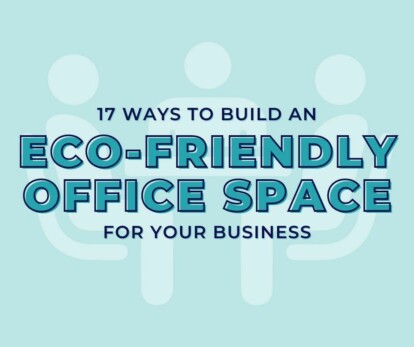Are You Struggling with Climate Anxiety?


As someone who runs a vegan and sustainable business, you may be wondering how to create an eco-friendly office space for your team. As well as benefiting the planet, prioritising sustainability for yourself and your employees can enhance their wellbeing, productivity, and overall satisfaction.
To help you, whatever stage you’re at on your business journey, here are seventeen practical and effective strategies to transform your office into a sustainable oasis:
Realistically, most businesses don’t have the luxury of designing an office from the ground up. However, if you are among the lucky few, here are some points to consider:
The foundation of an eco-friendly office begins with thoughtful building design. If you’re able to prioritise sustainability from the outset, you can significantly reduce your environmental footprint. You’ll also be better placed to adapt to new eco-friendly technologies.
The first step is to find an architect and other building specialists who are fluent in sustainability. They should be able to help you explore eco-friendly building materials, such as bamboo, hempcrete, reclaimed wood, and recycled steel.
In addition, they’ll help you pinpoint how to use utilities and other resources in an environmentally friendly way.
During the design stage, you’ll want to consider things like maximising natural light in the building to minimise the need for artificial lighting or how to heat or cool the building or reduce how much water you waste.
Incorporating green spaces both indoors and outdoors will support your team’s health and wellbeing at work and, coupled with efficient ventilation systems, should help to promote air quality and circulation.
Whether you’re starting with a new build or simply want to make your existing office space more eco-friendly, you can make a difference by shifting how your business approaches its use of utilities:
One in four humans on Earth does not have access to safe drinking water, and yet it’s estimated that businesses waste a staggering 50 litres of water per employee per day in a typical UK office building!
Water is a precious resource that should be conserved whenever possible.
Water-saving fixtures such as low-flow taps and toilets can help to reduce water consumption. Encourage your employees to report leaks promptly and practice water-conscious habits, such as turning off taps when not in use and fixing dripping taps.
By collectively minimising water waste, you should make significant financial savings while doing something positive for the environment.
It’s far more enjoyable to work in a place that has good air quality, and it can benefit the planet, too.
You can implement measures to improve the air quality in your office, such as using eco-friendly cleaning products, introducing indoor plants for natural air purification, and ensuring proper ventilation throughout the workspace.
You will need to budget for the regular maintenance of HVAC systems (heat, ventilation, and air conditioning systems such as boilers, air conditioning units, ducts, and moisture vents) and air filters – keeping these in tip-top condition can minimise indoor air pollutants and allergens.
Encourage the use of energy-efficient lighting solutions such as LED bulbs and motion-sensor lights. Remind employees to turn off lights when leaving rooms and, as we’ve already mentioned above, use natural daylight whenever possible to reduce energy consumption.
To slash the energy usage in your office, one option is to introduce smart plugs and smart power strips that automatically shut off power to electronics when they’re not in use or during designated times, reducing standby power consumption and saving energy.
As the link above highlights, switching to smart power strips can reduce out-of-hours electricity usage by 10%.
Whatever the size of your business, the chances are that you can update the supplies you buy and the systems you have in place to make them more eco-friendly. Here are a few ideas:
Promote the use of reusable and recyclable office supplies such as refillable ink cartridges, recycled paper products, and eco-friendly pens and pencils made from sustainable materials like bamboo or recycled plastic.
Encourage double-sided printing, digital document sharing, and printing only when necessary to conserve paper and reduce ink and toner consumption. Set default printer settings to draft mode or grayscale to minimise resource usage for routine printing tasks.
You might even want to commit to being a paperless office. There are many ways to achieve this, including opting for cloud-based storage, using digital planning apps, choosing paperless marketing methods, and more.
If an external cleaning company cleans your office on a regular basis, then it’s worth talking to them about using eco-friendly cleaning products or even choosing a green cleaning business the next time the contract is up for renewal.
However, if you manage your cleaning in-house, aim to choose vegan, environmentally friendly products. You can make simple switches, such as swapping paper towels for microfibre clothes or plastic sponges for those made from natural fibres.
Look at implementing a waste reduction and recycling programme in your business to reduce the amount of waste sent to landfills.
As we’ve discussed in various ways, you can encourage employees to reduce paper waste by digitising documents and using online collaboration tools.
You might also want to set up designated recycling stations for paper, plastic, glass, and electronics and educate employees on proper sorting techniques. Additionally, promote the use of reusable items such as mugs, water bottles, and food containers to further reduce waste generation. If you have the budget, you could provide these items in the staff kitchen rather than expecting your employees to buy them.
There are a growing number of waste management services available to businesses, including ones that can strip waste (for example, obsolete electronics) down to its component parts for reuse.
Another way to make your business more eco-friendly is to create a composting programme in the office kitchen for food waste, coffee grounds, and other organic materials. Provide designated bins and educate employees on what can be composted to divert waste from landfills and create nutrient-rich soil for gardening or donation.
Creating an eco-friendly office space is about more than what happens within the office. You can also make a difference through how your staff get to work or even when and where they work. Ideas here include:
Encourage employees to embrace eco-friendly transportation methods for their commute to work.
You can do this by offering incentives for car sharing, biking, walking, or using public transport, such as preferred parking spots or subsidies for public transit passes. Provide amenities such as bike racks, lockers, and showers for employees who choose to bike to work, promoting physical activity and reducing carbon emissions from daily commutes.
The pandemic proved that many jobs can be successfully conducted from home, cutting the need for the daily commute altogether and reducing your business’s carbon footprint.
If home working isn’t possible for your business, another option is to explore flexible work arrangements that give people off-peak travel options and the chance to work around other life commitments.
When it comes to sustainability, our collective efforts have the power to make a huge difference. Think about ways you can bring your team together to support your eco-friendly mission, as well as connecting with your local vegan business community:
Foster a culture of sustainability within the workplace by engaging employees in green initiatives and providing education on eco-friendly practices. Organise workshops, seminars, and training sessions to raise awareness about environmental issues and empower employees to act. Encourage feedback and participation in sustainability efforts and recognise and reward members of your team who contribute to the company’s green goals.
Running employee wellness programmes that promote healthy and sustainable lifestyles can help to create a positive workplace culture that centres around your sustainability goals.
These programmes might include flexible working schemes, yoga or meditation classes, bike-to-work challenges, community allotments, or healthy eating initiatives, to name just a few.
Another way to create an eco-friendly office space is to source office supplies, furniture, and services from local sustainable businesses whenever possible.
Choose products that are made with eco-friendly materials, produced ethically, and sourced locally. This will help reduce carbon emissions from transport, contribute to ethical working practices, and enrich the local business community. (Always make sure that you check the supply chain!)
Plus, by supporting local economies and sustainable practices, you can contribute to the larger movement towards a more environmentally conscious business ecosystem.
Host eco-friendly events and meetings to connect with the local business community or strengthen team relationships.
At these events, you could use biodegradable or reusable serving ware, source local and organic vegan catering options, and try to avoid single-use plastics and packaging. Encourage attendees to carpool or use alternative transportation to reduce emissions associated with travel to the event.
As with all things business-related, it’s important to track your efforts so you know what’s working and where there are opportunities for more eco-friendly changes:
Track and measure the environmental impact of office operations over time using sustainability metrics and tools. This could include monitoring your energy consumption (is it going down as planned?), waste generation, water usage, and carbon emissions. This will help you to identify areas for improvement and set ongoing targets.
Creating a green office space is not just about reducing your environmental footprint—it’s about creating a healthier, more productive, and more sustainable workplace for everyone. With each of the above strategies, you can transform your office into a beacon of sustainability and inspire others to follow suit.